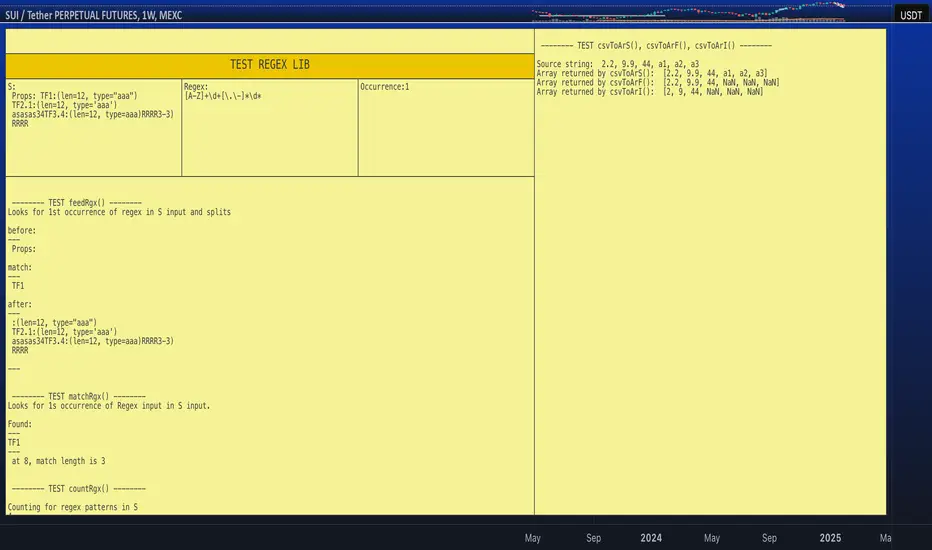RegexLib

This library contains regular expression (regex) search functions which are helpful, in particular, in reading configuration inputs.
- feedRgx(): Searches for the first occurrence of `regex` pattern in the `src` and returns `src` split into parts as a tuple: `[<before the match>, <match>, <after the macth>]`. If no match returns `[src, "", ""]`
- countRgx(): Counts `regex` occurrences in the `src`.
- matchRgx(): Finds given `occurence` of `regex` pattern in `src` string.
NB! countRgx() and matchRgx() do not support `^` (beginning of the string placeholder), lookbehind some other complex patterns, because they works by cutting off the part of the string up to the first found occurence (inclusive) and then continuing the search on the remainder of the string. E.g. in a four line source `(?<=\n).+\n` should match the second and the third lines but matchRgx only matches the second line since after matching it continues to search in the remainder AFTER the match only.
█ FULL LIST OF FUNCTIONS AND PARAMETERS
method feedRgx(src, regex)
Searches for the first occurrence of `regex` pattern in the `src` and returns `src` split into parts as a tuple: `[<before the match>, <match>, <after the macth>]`. If no match returns `[src,"",""]`
Namespace types: series string, simple string, input string, const string
Parameters:
src (string): (string) String to search for the regex pattern
regex (string): (string) RegEx pattern
Returns: A tuple `[begS, matchS, endS]` where `begS` is the part of the `src` string from the beginning up to the
first occurence of the `regex` pattern (or up to the end if not found), `matchS` - the first occurrence of the
regex pattern and `endS` the part of the strinf following the first occurrence of the `regex` pattern.
method countRgx(src, regex)
Counts `regex` occurrences in the `src`. ___NB!___ _Does not support `^` (beginning of the string
placeholder), lookbehind some other complex patterns, because it works by cutting off the part of the string up to
the first found occurence (inclusive) and then continuing the search on the remainder of the string. E.g. in a four line source `(?<=\n).+\n` should match the second and the third lines but matchRgx only
matches the second line since after matching it continues to search in the remainder AFTER the match only. _
Namespace types: series string, simple string, input string, const string
Parameters:
src (string): (string) String in which the regex pattern occurences are to be counted
regex (string): (string) RegEx pattern
Returns: The number of occurrences of the `regex` pattern in the `src` string.
method matchRgx(src, regex, occurrence)
Finds given `occurence` of `regex` pattern in `src` string. ___NB!___ _Does not support `^` (beginning of the string placeholder), lookbehind and some other complex patterns, because it works by cutting off the part of the string up to the first found occurence (inclusive) and then continuing the search on the remainder of the string. E.g. in a four line source `(?<=\n).+\n` should match the second and the third lines but matchRgx only matches the second line since after matching it continues to search in the remainder AFTER the match only. _
Namespace types: series string, simple string, input string, const string
Parameters:
src (string): (string) String to search for the regex pattern
regex (string): (string) RegEx pattern
occurrence (int): (int) (Default is 1) The number of the occurrence to search for. If this params exceeds the actual
number of occurrences of the pattern in the `src` string the following tuple is returned [na, src length, na]
Returns: [matchS , matchPos, matchL] A tuple, matchS - matched substring, matchPos - position of the match, matchL - match length
█ HOW TO USE
See DEMO section in the script.
You can test regex patterns by playing around with script input settings.
Another usage example can be found in my CSVParser and HTFMAs libraries.
Added:
method csvToArS(this)
method csvToArF(this)
method csvToArI(this)
Returns a string/float/int array of CSV values
Parameters:
this (string): (string) String of comma separated values
Returns: A string/float/int array of values from `this` string.
Perpustakaan pine
Dengan semangat TradingView yang sesungguhnya, penulis telah menerbitkan kode Pine ini sebagai pustaka sumber terbuka agar programmer Pine lain dari komunitas kami dapat menggunakannya kembali. Salut untuk penulis! Anda dapat menggunakan pustaka ini secara pribadi atau dalam publikasi sumber terbuka lainnya, tetapi penggunaan kembali kode ini dalam publikasi diatur oleh Tata Tertib.
Pernyataan Penyangkalan
Perpustakaan pine
Dengan semangat TradingView yang sesungguhnya, penulis telah menerbitkan kode Pine ini sebagai pustaka sumber terbuka agar programmer Pine lain dari komunitas kami dapat menggunakannya kembali. Salut untuk penulis! Anda dapat menggunakan pustaka ini secara pribadi atau dalam publikasi sumber terbuka lainnya, tetapi penggunaan kembali kode ini dalam publikasi diatur oleh Tata Tertib.